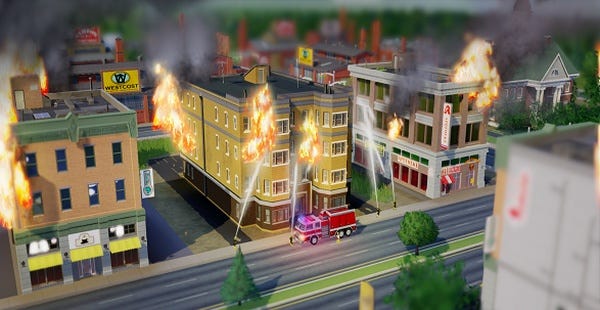SimCity Boss's "Straight Answers" Seem Pretty Wiggly
Arguing With Themselves
What Maxis are doing is frankly peculiar. Earlier this week we posted a story revealing that claims that SimCity required online servers to run non-regional computations were not the case. That night we were promised a statement from the studio, but heard nothing. Repeated emails to EA have resulted in no response since, and the whole situation has become more muddy with each day. It's since been revealed that population numbers are nonsense, even down to leaked Javascript code featuring "simcity.GetFudgedPopulation" as a function. We've learned that city size limits are arbitrary, pathfinding is rudimentary at best, and Eurogamer's absolutely superb review lists many more bugs, broken features, disappearing pretend-money and never-arriving resources.
So it's all the more odd to see Maxis head Lucy Bradshaw acting as if none of this is happening, and instead just carefully rewording her mantra of how SimCity is only supposed to be played online, but this time leaving out the bit about server-side computations for local play.
This week's fuss all began after Bradshaw's repeated statement that SimCity needed to be online simply to function. A claim we learned was not the case.
On the SimCity blog on 20th December 2012 Bradshaw wrote,
"GlassBox is the engine that drives the entire game — the buildings, the economics, trading, and also the overall simulation that can track data for up to 100,000 individual Sims inside each city. There is a massive amount of computing that goes into all of this, and GlassBox works by attributing portions of the computing to EA servers (the cloud) and some on the player’s local computer."
Speaking to Polygon on the 9th March she again said,
"With the way that the game works, we offload a significant amount of the calculations to our servers so that the computations are off the local PCs and are moved into the cloud. It wouldn't be possible to make the game offline without a significant amount of engineering work by our team."
And talking to Kotaku in the same week, Bradshaw yet again stated,
"Online connectivity as a creative game design decision was infused into the game's DNA since its inception and so we're fully committed to delivering against that experience first. A significant portion of the GlassBox Engine's calculations are performed on our servers and off of the player's PCs. It would take a significant amount of engineering work from our team to rewrite the game so that all of those functions are calculated locally without a significant performance hit to the player."
In today's posting the studio boss writes,
"From the ground up, we designed this game with multiplayer in mind – using new technology to realize a vision of players connected in regions to create a SimCity that captured the dynamism of the world we live in; a global, ever-changing, social world... We also made innovative use of servers to move aspects of the simulation into the cloud to support region play and social features."
Spot the difference.
RPS knows that the "simulation" being run on the EA servers is about 1% of the simulation being run on your own PC, so even this rebranded version of the claim still rings a little oddly. It's not clear what exactly is so innovative about having interactions between different players be handled by online servers - that's kind of how multiplayer works. But yes, it's absolutely undeniable that the multiplayer aspects of the game require connection to the, er, multiplayer servers. No one was disputing this, because to dispute that would be frog-hatted mad. The reason there was any fuss in the first place were the claims that the servers were involved in much more, aspects that were they really calculating would indeed deny the simple possibility of a single-player, non-regional version of the game.
And let's stress again here: If Maxis wanted to make an online-only, multiplayer-only version of SimCity, then that's their call. No one has a God-given right to a single-player version, and while deliberately shooting themselves in the foot with a cannon by refusing to offer one seems a little odd, it's Maxis's call. The issue that RPS has only ever wanted to tackle was getting to the truth about why not. And as many have since demonstrated with offline play hacks (there's a new one here), we didn't have it. We could indeed write a very decent, very sensible editorial on why not offering single-player for a SimCity game is hard-boiled lunacy, but that was never the point.
Bradshaw's post, which appears to be some sort of attempt at damage limitation - without actually ever addressing the issues raised - re-emphasises the point that they wanted it to be always online because of how they designed the game. She then lists the functions those server sums supply. And they're what we already knew - they let the social game be social. This list that is basically just "the game has co-operative multiplayer" eight times seems to be an attempt to reveal just how grand this aspect is, how intrinsic it is to... something. It doesn't manage this. What we're learning from the many players posting videos, and the reviewers who actually played the game properly before smothering it with rosettes, is that those regional functions don't work very well either.
Things then take a turn for the darned strange when Bradshaw adds,
"The game we launched is only the beginning for us – it’s not final and it never will be. In many ways, we built an MMO."
In almost no ways have they built an MMO. The first M rather puts pay to that suggestion, with minimal numbers of players interacting, and even then interacting through relatively remote systems. Let alone that it's a management game that previously functioned perfectly well without the addition of social aspects - which is what makes it so mystifying that apparently adding something has caused so much more to be taken away. But the association with an "MMO" is an essential part of the vocabulary Maxis and EA want us to use, to reinforce the notion that this hasn't been about piracy, preventing solo-play cheating, and controlling players' experiences. "Oh, MMOs," we're supposed to say. "Yeah, good point, because you couldn't play World Of Warcraft offline, could you? So this must be the same." We're asked to ignore that SimCity looks, feels and plays like a single-player game with some multiplayer functionality, and instead conflate it with an entirely different type of game. It's a blatantly fallacious stance, but one that's unfortunately perpetuating. (Check out many other sites' coverage of Bradshaw's statements this evening.) Bradshaw then says,
"So, could we have built a subset offline mode? Yes. But we rejected that idea because it didn’t fit with our vision."
And this is something else we've been meaning to mention. This notion that SimCity was born in Maxis's womb as a permanently online, perpetually social game, is somewhat at odds with, well, Maxis's own words from just a year ago. Back then they made it clear to the press that the internet would only be needed to boot the game, and then it could run offline after that. These straight answers seem as wobbly as the new SimCity's roads. A game that was always intended to be so intrinsically online that no offline mode was even conceivable, except for last March, a year before the end of development, when it was.
Obviously we would still desperately love to hear from Maxis to explain the discrepancies we've discussed. To ask why it was repeatedly claimed that the servers were so integral for running the core game, when all people needed to do to prove otherwise was pull the ethernet cable out the back of their machine. We want to know how a game that a year ago only needed the internet to launch, is now a game that was originally conceived to be permanently online. If this is a confusion, then please do clear it up for us.



















